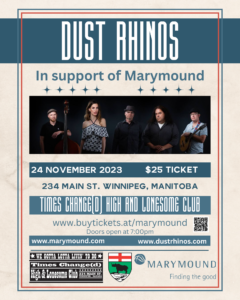Gardening and learning about Indigenous culture helps youth heal from trauma
-Maggie McIntosh, Winnipeg Free Press- June 26, 2018
The leafy, green tobacco plants in the community garden don’t look like pill bottles on pharmacy shelves, but they are no less of a medicine; they can help youth heal from traumatic experiences, Indigenous mentors at a Winnipeg social services agency say.
Marymound offers rehabilitation services, including group homes, mental health supports and addictions workshops, for youth up to age 17 who have experienced severe trauma. Youth with “high needs” are referred to the Manitoba organization from Child and Family Services, so they can access psychologists, behaviour specialists, and other clinical services, said Ken McIntyre, Marymound communications manager.
“We are helping them change their lives with the work that we do in helping them reconnect to the land, the language, to spirit, to who they are, to their connection with the creator, to the medicines, to all of our sacred items, from the drums to the rattles,” said Raven Hart, a member of the Nisichawayasihk Cree Nation (Nelson House) who works in the gardens at the facility.
Hart was hired two years ago as the first “Indigenous land-based cultural mentor” at Marymound, to teach youth about Indigenous practices through gardening and food preparation. From the blessings she arranges for the seedlings to planting herbs to taking participants on walks to show them wild berries, she said she’s always teaching youth about their culture.
“I teach them about the medicinal properties of every vegetable that they grow, how it heals your body and how it helps your body,” she said.
During the first year, she mainly grew tobacco with the youth and her co-worker, Reanna Merasty, a 23-year-old student mentor who belongs to Barren Lands First Nation, near Reindeer Lake. When dealing with tobacco, Hart said their process starts with drumming and singing to the seedlings before planting them, then they pick weeds and water the plants.
“We really develop relationships with our plants,” she said. “That’s really who we are as Indigenous people, our connection to land.”
Every lesson is about building emotional, spiritual and mental wellness, Hart said, adding when youth learn about the creator who built all the beautiful nature around them, “they get to see how beautiful they are, too.”
“We’re teaching them about health and wellness and that develops self-esteem,” she said.
When a tobacco plant is fully grown, the leaves are dried and hung in the basement for weeks before being baked and cured. When ready, Hart said tobacco is used during cultural ceremonies, gifted to elders, or used to grow more.
Now into their second summer, they’ve added superfoods such as beets, corn, kale and squash to their gardens, alongside beds of thyme, rosemary and spearmint. Strawberries, raspberries and blueberries are going to be planted this summer, too, Hart said.
They also just built a medicine garden, which was designed by Merasty, who is studying architecture at the University of Manitoba, and planted sage, white cedar and sweetgrass in it.
No youth could speak to the media because they are under 17, and they are healing, the employees said.
However, “We’re just noticing huge changes in our youth,” Hart said.
By fusing clinical and spiritual healing, McIntyre said Marymound provides “total healing.”
Often times, the Indigenous children who come to the grounds have experienced racism or have been ridiculed for who they are, he added.
“Then they come here and they have pride. They build strength and it helps them heal.”

 Conferences & Training Centre
Conferences & Training Centre